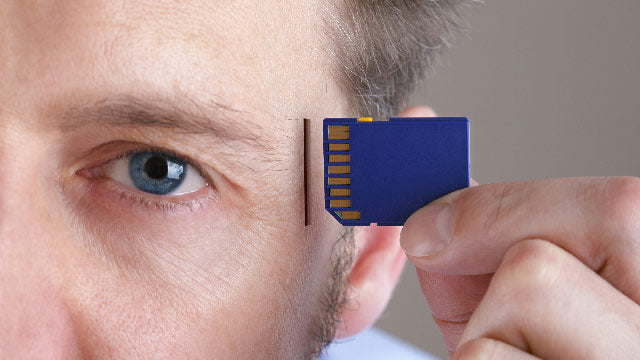
Sep 20 , 2017
0 Comments
Bringing back Memory
Human memory is a humungous and fascinating field. Human memory involves the ability to both preserve and recover information we have learned or experienced in the most stimulating way. As we grow older, it’s true that certain brain changes are inevitable; however, if there is work on the same it can be rectified and to some extent reversed also.There are also cases where memory loss happens at an early age; the good news is that this too can be taken care of and modified unless of severe nature.
The human brain is a very complicated organ involved in just about every facet of human life. The three central regions of the brain are the brain stem, cerebrum, and cerebellum. The brain cells mostly control life-support functions, such as beating of the heart, food digestion, maintaining body temperature, and breathing, and is located at the lowermost part of the skull. The cerebellum controls motor functions and balance, and also cognitive functions such as language, attention, and the emotional responses to pleasure and fear.The cerebrum is 85 percent of the brain weight and consists of the cerebral cortex, which helps decision-making and many other cognitive abilities like the processing, and storage of short-term and long-term memories. Let us study the memory pattern.
At some point in life, we’ve all misplaced keys, blanked on an acquaintance's name, or forgotten a phone number. In today’s stressful life it is becoming more and more strenuous to maintain the perfect balance of mind and memory retention. As we get older, our minds fade. In most of us, there is a gradual decline in memory--from 6% to 10% per decade--beginning at about age 30. There are many causes for the same. There are approx 280 possible causes of memory loss, ranging from the side effects of medication to medical disorders. Below are some prominent and leading causes listed:
Causes of Memory loss
1. Medications: Over-the-counter medications and regular maintenance pills can interfere with or cause loss of remembrance. Possible culprit includes antidepressants, antihistamines, anti-anxiety medications, muscle relaxants, tranquilizers, sleeping pills, and pain medications.
2. Alcohol, tobacco, or drug use. Excessive alcohol consumption has also been recognized as a cause of memory loss.
3. Smoking destroys memory by lowering the amount of oxygen that reaches the brain. Studies tell us that people who smoke find it tougher to put faces with names than do individuals who don't smoke. Unauthorised drugs can change chemicals in the brain that can make it hard to recall memories.
4. Sleep deprivation: Sleep is important for memory. Getting too little sleep or frequently waking in the middle of the night can lead to exhaustion, and interferes with the ability to consolidate and retrieve information.
5. Depression and stress. Depression can make it hard to focus, which in turn can mess up memory. Stress and anxiety can also damage concentration. When we are tense and, our mind is overworked or distracted, our ability to remember suffers. Emotional trauma also causes memory loss.
6. Nutritional deficiency: Good food, including proteins and fats -- are necessary to maintain right brain functioning. Inadequacy in vitamin B1 and B12 also can affect memory loss.
7. Head injury: A fall or automobile accident, for example -- can injure the brain and cause both short- and long-term memory loss. The memory may gradually improve over time.
8. Stroke: When blood flow reaching the brain is hampered due to blockage in the blood vessel to the brain stroke happens. Strokes often cause short-term memory loss and may cause prolonged and permanent memory loss.
9. Dementia: Dementia is the name for progressive loss of memory, that is harsh enough to interfere with the ability of normal functioning in daily life. Although there are many causes of dementia -- including blood vessel disease, drug abuse -- the most common is Alzheimer's disease. This is characterized by a progressive loss of brain cells and other irregularities of the brain.
10. Cholesterol linked with memory loss: The "good" cholesterol that removes fatty plaque from the body may also be associated with memory, and low levels may indicate a risk of dementia or memory loss.
Cognitive Causes of Memory Loss
11.Distraction
In today's life and age we all multi-task and do various things in one go.Phone call along with cooking, reading along with computer work, etc., our brain due to receipt of too much information at one go, does very poor registration of the events and hence memory gives way in remembering the same again.
12.Natural Memory Capacity
Some people naturally don't have a great memory.A person may have different grasping and memorizing power than another human being and may have different recall ability to remember the same incident more sharply.
Other causes of memory loss may involve an under working or overworking thyroid and infections such as HIV, tuberculosis, which affects the brain.
Treatment of Memory loss
Treatment for memory loss depends on the causes of it. In most cases, it may be recoverable with treatment. For example, memory loss happening due to medications may resolve with a change in medicines. Treatments/therapy may also be particular to conditions related to memory loss.
1. Mental activeness
Physical activities help keep our body in shape, and mentally stimulating activities help keep our brain in shape and hence keep memory loss away. Do crossword puzzles. Play cards. Take different/alternative routes when driving on the same path.
Pursue to play a musical instrument. Volunteer at a local school or RWA for community work which will keep the mind and body active and give a sense of achievement and fulfillment.
2. Socialize regularly
Social meetings help to avert depression and stress. Look for opportunities to meet your loved ones, friends and others, particularly if you live alone.
3. Organize yourself
We are more likely to forget things if our home is cluttered and things are not organized. Write down tasks, appointments and other important events in a particular writing pad, calendar or phone note book. You may repeat each entry out loud and audible as you write it down to help concrete it in our memory. Keep the "What-to-do" lists updated and strike off things and entries you've completed. Set aside a fixed place for your wallet, keys, spectacles and other essentials to find them there again.
Restrict distractions and plan not to do too many things at one go as If you target on the data that you're trying to remember, you are more likely to recall it later. A quick trick to remember things and events: To connect what you're trying to remember and register in your memory connect the same to a happy incident or a favorite song or another familiar concept and you will not forget the same quickly.
4. Sleep Well
Sleep is an essential ingredient in helping to consolidate our memory so that we can recall them down the memory road. Must try to get enough sleep always. In India, most adults require six to eight hours of sleep a day to manage standard efficiency.
5. Eat a healthy diet
It is a proven fact that healthy eating is as beneficial for your brain as it is for your heart. Eat fruits, vegetables, and whole grains. Low-Fat protein ingredients, such as fish, lean meat, and skinless poultry. What you drink is important too. Too much alcohol consumption can lead to confusion and memory loss.
6. Include physical activity in your lifestyle
Athletic activity increases blood progression to our entire body, including our brain. This may help keep our memory razor sharp.
For most healthy adults, we recommend at least 160 minutes a week ( 25 minutes a day approx) of medium strength aerobic activity, such as fast pace walking, or 75 minutes a week of strenuous aerobic exercise, such as jogging. If you do not have time for a full workout, squeeze in a few 10-minute walks to make up.
7. Manage chronic conditions
We should follow our doctor's advice for any chronic conditions, such as depression, hypertension, Hypercholesterolemia, diabetes, and renal problems. The better management of the same, the better our memory is likely to be. Also, we need to review/adjust your medications with our doctor regularly.
A lot of drugs also aid memory loss.
When to ask for help.
If memory loss affects our ability to complete our usual daily activities — we should consult the doctor. There might be a physical examination or blood tests, or Sometimes other investigations are needed too. Treatment will depend on what's causing memory loss.
Below are some more treatment helps to aid memory:
• Learn a new skill. We all at some point in life, need to learn something new, and this is the best time to do that.
• Participate in your RWA or community school activities.Community working enhances the memory sharpness and focus. Group activities always bring the better of all the skills in us.
• We must learn to get into a habit of everyday keeping our wallet, purse, keys, and eyeglasses in the same place to find them there without any memory effort again.
As far as a cure for memory loss is concerned, there are also ample drugs available in the market and are prescribed by allopathic doctors. However, we cannot rule out the dangerous and scary repercussions and side effects of these medicines taken for a long time. Allopathic medicines, if consumed on a regular basis, majorly affect the liver and kidneys and they slowly start giving way. It is reported to have side effects like nausea, vomiting, diarrhea, UTI infections and weight loss, etc. which keep recurring to interfere with the regular running of our lives.
Here comes the need of products that can be taken carefree to cure memory loss and has no side effects at all. One such product is Memtone tonic or syrup by the famous AIMIL pharmaceuticals.
Memtone is an ayurvedic preparation for memory enhancement at any age. It is an excellent nervine tonic, acts as a brain enhancer, helps to raise mental performance and enhances our memory, concentration, comprehension, recall, and alertness. Reduces stress, reduces pain in the head. It is filled with natural antioxidant herbs which increase neuroprotective agents to enhance learning and memory parameters. Memtone improves learning ability in children and reduces day to day work pressure and sleeplessness in adults. It has no side effects as other allopathic drugs which cure these problems mentioned above.



